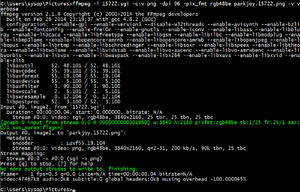LAV Filters
 |
|

FFmpeg running on Microsoft Windows
|
|
| Original author(s) | Fabrice Bellard |
|---|---|
| Developer(s) | FFmpeg team |
| Initial release | December 20, 2000 |
| Stable release | 3.3 (April 13, 2017) |
| Preview release | Git |
| Repository | git |
| Development status | Active |
| Written in | C and Assembly |
| Operating system | Windows, OS X, and Linux; may be compiled for other OSes. |
| Platform | x86, ARM, PowerPC, MIPS, DEC Alpha, Blackfin, AVR32, SH-4, and SPARC; may be compiled for other desktop computers |
| Type | Multimedia framework |
| License |
LGPL 2.1+, GPL 2+ Unredistributable if compiled as such |
| Website | ffmpeg |
FFmpeg is a free software project that produces libraries and programs for handling multimedia data. FFmpeg includes libavcodec, an audio/video codec library used by several other projects, libavformat (Lavf), an audio/video container mux and demux library, and the ffmpeg command line program for transcoding multimedia files. FFmpeg is published under the GNU Lesser General Public License 2.1+ or GNU General Public License 2+ (depending on which options are enabled).
The name of the project is inspired by the MPEG video standards group, together with "FF" for "fast forward". The logo uses a zigzag pattern that shows how MPEG video codecs handle entropy encoding.
The project was started by Fabrice Bellard (using the pseudonym "Gérard Lantau") in 2000, and was led by Michael Niedermayer from 2004 until 2015. Some FFmpeg developers were also part of the MPlayer project.
The project publishes a new release every three months on average. While release versions are available from the website for download, FFmpeg developers recommend that users compile the software from source using the latest build from their source code Git version control system.
On January 10, 2014, two Google employees announced that over 1000 bugs had been fixed in FFmpeg during the previous two years by means of fuzz testing.
...
Wikipedia
